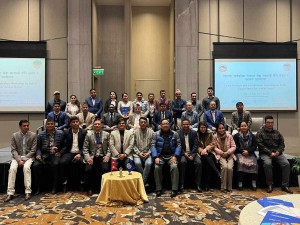
Youth and Entrepreneurship Development Project - Plan International
1716882354.jpg)
The vocational training course, supported by Plan International Nepal and SIDS Nepal (Sindhuli), was established under the Youth and Entrepreneurship Development (YEED) Project and executed by Action for Development (AfD). The program aimed to equip participants from Kamalamai, Dudhauli, and Marin municipalities of the Sindhuli District with skills to succeed as general cooks and beauticians. Local government representatives and the field coordinator of AfD and SIDS Nepal closely monitored the program, ensuring its success.
Beautician Training:
The beautician training was the first vocational initiative undertaken. This 65-day course spanned 390 hours and involved 20 female participants from Dudhauli, Sunkoshi, and Marin. The participants were trained in hair coloring, styling, skincare, makeup application, and other beauty procedures. They learned to enhance their natural beauty and gained the confidence to offer personalized beauty solutions that met job market and customer expectations. The curriculum included instructions on safety, health, and hygiene standards, ensuring participants were well-versed in maintaining high standards in their professional environments.1716882399.jpg)
Training was conducted in groups of 10, with each group assigned a trainer. The training comprised 20% theoretical and 80% practical sessions, allowing participants to practice what they learned under the supervision of experienced instructors. The participants were also provided with business skills to help them establish and run their own beauty businesses successfully.
General Cook Training:
The general cook training, also a 65-day course of 390 hours, involved 52 participants (16 female and 36 male) from Dudhauli, Sunkoshi, and Marin. Participants were trained in cooking various cuisines, including Chinese, Indian, Continental, and regional Nepalese dishes. The training aimed to develop the participants' practical skills and knowledge to excel in the culinary field, keeping them updated with current trends and industry best practices.1716882477.jpg)
Similar to the beautician training, this program also focused on practical sessions, making up 80% of the training. Participants were organized into groups of 10, each with an assigned trainer, and engaged in hands-on cooking exercises. They were taught to prepare a variety of dishes and learned the importance of safety, health, and hygiene in the culinary environment. An On-The-Job training (OJT) components were conducted at various hotels and restaurants, giving them real-world experience and improving their employability.
Monitoring and Evaluation:
Project monitoring was a crucial element in the sustainability of the project component as it adhered to the agreements between AfD and SIDS. A panel comprising members from the SIDS district team and AfD conducted monitoring at all levels. The training/field coordinator was responsible for maintaining the quality of the project work at the field level. Monitoring officers evaluated various criteria, such as the quality of training content, suitability of the training venue, preparedness of trainers, and participant satisfaction.
Lessons Learned and Moving Forward:
The training programs demonstrated the dedication of1716882971.jpg) participants and the monitoring team towards personal and professional development. The participants showed a robust work ethic and a strong commitment to learning. To improve future programs, it was suggested to update the curriculum regularly and assess participants' intentions and motivation more thoroughly during the selection process.
participants and the monitoring team towards personal and professional development. The participants showed a robust work ethic and a strong commitment to learning. To improve future programs, it was suggested to update the curriculum regularly and assess participants' intentions and motivation more thoroughly during the selection process.
The closing ceremonies for the training programs involved representatives from Plan International, SIDS Nepal, and local municipalities. Participants received certificates of participation, signifying the successful completion of their training. This program has undoubtedly enhanced the livelihoods of the people in the Sindhuli district, equipping them with valuable skills for their professional journeys.




1719820174.jpg)